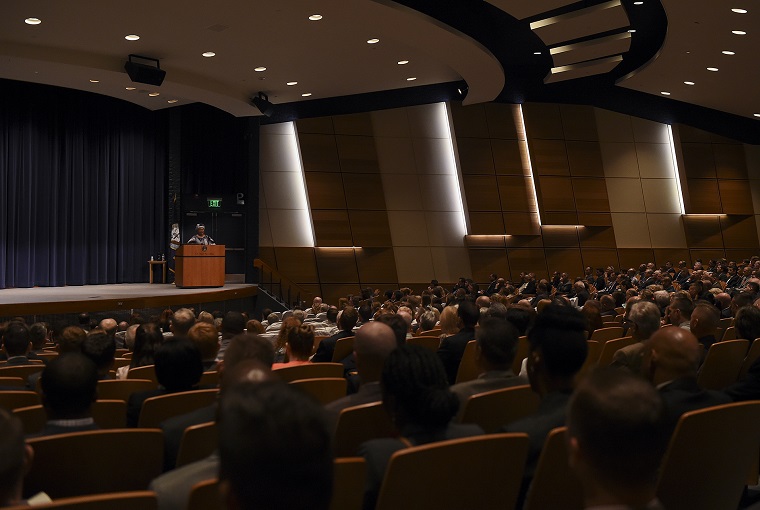Nobel laureate speaks at Naval War College Women, Peace and Security Conference

About this Event
Event Information
Mary Raum, Chair of Women, Peace, and Security Conferences
This event is not open to the general public
${isOpenDescription}NEWPORT, R.I. – 2011 Nobel Peace Prize recipient Leymah Gbowee, who led a women’s peace movement that helped bring an end to the Second Liberian Civil War in 2003, was the featured speaker at U.S. Naval War College’s Woman, Peace and Security Conference in Newport, Rhode Island last week.
During Gbowee’s presentation “Women, Peace and Security: A Necessity for Global Peace” she spoke about the role of women in the struggle for peace in her home continent. During the evening lecture open to all students, faculty and staff at the school, Gbowee shared some of her experiences in Liberia.
“While the men were out fighting, the women were in the communities nurturing and trying to sustain peace,” said Gbowee. “This in my opinion was women, peace and security in action.”
She also shared some of the methods women use to gain the respect of the men during conflict and eventually act as mediators.
“The women knew that humiliation is one of the main drivers of violence,” she said. “And that the best antidote to humiliation is respect, and that was the strategy they employed. When everyone felt that their point of view was understood, the women would work to restore relationships between victims and offenders.”
This year’s conference, titled "The Next Decade: Amplifying the Women, Peace and Security Agenda," is the fourth at NWC and focused on the broad-level interconnections of women, peace and security with military, economic and social freedoms around the globe.
The topics covered are in response to current political conditions, according to the conference director.
“There is a theme recurring right now globally that has the potential to reduce the positive changes that have been made since 2000 in this arena,” said Mary Raum, professor in National Security Affairs and organizer of the conference. “Turning the volume down on what has been accomplished and moving in a backward direction could be the result of this reduction in the role of women in society. What is needed in these instances is the continued amplification of the missions and objectives of the women peace and security agenda.”
The two-day event brought together leaders from academia, military and non-governmental organizations to discuss the links between the security of women and the security of states.
Speakers were selected for the event for three reasons, said Raum.
“These people have advanced experience in the women, peace and security agenda, and they have new or fresh viewpoints about an area important to the continuation of keeping women, peace and security moving in a forward direction, or they have studied in depth in an academic environment some motivating current issue in the field,” said Raum. “Selections were made to ensure there was a mix of active-duty military professionals; both U.S. and international, scholastic professionals; not-for-profit representatives; and those that work in government from various communities such as security, economics or law.”
Established in 2012, the conference continues to grow in perspective and scope to include ideas from each military service and every global continent.
The conference is the only U.S. military academic program specifically related to the topic, according to Raum.
Sessions during the conference included Training Education and Reform; Media and Film Promoting the Power of Women; Japan: Ongoing Concerns for the Next Decade; International Operational and Tactical Perspectives; and Athena Rising: How and Why Men Should Mentor Women.
More on Women, Peace, & SecurityDownloads for this event
Working PapersMost Recent
8:00 a.m.
U.S. Naval War College, 686 Cushing Rd, Newport, RI 02841
U.S. Naval War College, 686 Cushing Road, Newport, RI 02841
U.S. Naval War College, 686 Cushing Road, Newport, RI 02841
8:00 a.m.
U.S. Naval War College, 686 Cushing Road, Newport, RI 02841
U.S. Naval War College, 686 Cushing Rd, Newport, RI 02841
